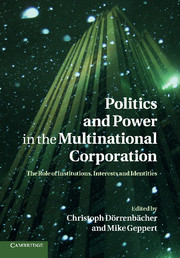 Politics and Power in the Multinational Corporation
Politics and Power in the Multinational Corporation Published online by Cambridge University Press: 26 April 2011
The current financial and economic crisis has negatively underlined the vital role of multinational corporations (MNCs) in our daily lives. The breakdown and crisis of flagship MNCs, such as Enron, WorldCom, Lehman Brothers, Toyota and General Motors, does not merely reveal the problems of corporate malfeasance and market dysfunction but also raises important questions, both for the public and the academic community, about the use and misuse of power by MNCs in the wider society, as well as the exercise of power by key actors within internationally operating firms. Given these and previous similar developments, it is surprising that questions about organizational power and politics have not had a more central role in the study of the MNC.
Historically, research on the MNC was focused on studying the influence and changing role of headquarters (HQ) management (e.g. Stopford and Wells 1972; Vernon 1966), with, for example, Hymer (1970) actually predicting that more geographical dispersion of MNCs would lead to greater concentration of decision-making power at the center. As long as HQ management was seen in the driving seat, the role of lower level managers, e.g. in local subsidiaries, and of other employees was mainly reduced to adaptation either to centrally set strategies or to external environmental pressures. Later, studies on the “evolution” of the MNC stressed that MNCs can hardly be managed top-down, especially if “diversification” and internationalization are increasing, but they did not “dare” shed more light on power relations and organizational politics.
To save this book to your Kindle, first ensure [email protected] is added to your Approved Personal Document E-mail List under your Personal Document Settings on the Manage Your Content and Devices page of your Amazon account. Then enter the ‘name’ part of your Kindle email address below. Find out more about saving to your Kindle.
Note you can select to save to either the @free.kindle.com or @kindle.com variations. ‘@free.kindle.com’ emails are free but can only be saved to your device when it is connected to wi-fi. ‘@kindle.com’ emails can be delivered even when you are not connected to wi-fi, but note that service fees apply.
Find out more about the Kindle Personal Document Service.
To save content items to your account, please confirm that you agree to abide by our usage policies. If this is the first time you use this feature, you will be asked to authorise Cambridge Core to connect with your account. Find out more about saving content to Dropbox.
To save content items to your account, please confirm that you agree to abide by our usage policies. If this is the first time you use this feature, you will be asked to authorise Cambridge Core to connect with your account. Find out more about saving content to Google Drive.